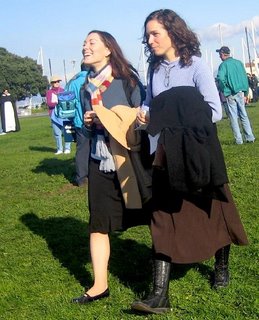Neopagastinians
First thing I must make clear that this post isn’t against pagans or paganism, not even against modern paganism in its entirety. Its central subject is identity politics, the politics of national revival, touching upon neopagan revivalism as a window into the mindset of identity politics, and from there tying it to the new nation that calls itself Palestinians.
From the days of the Roman Peace up to the last centuries, Europe had lived under a system in which nations existed but national consciousness was muted in favor of the unifying identity, whether Roman citizenship in antiquity or Christian religion in the Middle Ages. There were, certainly, episodes involving the eruption of national consciousness, for example the Hundred Years War between England and France, but nationalism, as opposed to there just being nations, emerged in the 17th century, in the wake of the Thirty Years War (1618–48) and riding on the lessening of religious fervor.
Nationalism grew in the 18th century, assumed a shaping role in the 19th century, fed by the Romanticist movement, and ran totally loose in the 20th century, being the prominent root cause of the two world wars. As a result of those wars, nationalism has been devalued in the minds of people from 1945 onward, devalued often to such a degree to the opposite extreme that it can no longer serve the West as a defense against the Islamic invasion. That is the reason why the religious, rather than national, identity of the non-Muslim hosts is much more promising—believing Jews, Christians and Hindus are far less likely to wish to appease the Muslim guests than are the “rootless cosmopolitans” behind the Politically Correct regime.
On the enemy side, nationalism is an import from the early 20th-century West (see my post The Californian Nation, from September 12, for a slightly fuller treatment), an attempt at countering the ascendancy of the West by adopting its own ideologies and modes of thinking. It has always been problematic, because the borders drawn by Britain and France after World War I cut across demographic sectors—witness the ethnic and religious mess in Lebanon and Iraq. But it remains a force to reckon with, because of its utility for Middle Eastern politicians, as well as the veneer of Western-type materially-driven feuding. Bashar Assad enjoys his despotism over the “Syrian nation”; in a pan-Arab superstate, he would be a regional governor at best, and in an Islamic Caliphate he would be lucky to be accorded dhimmi status. And the “Palestinians” have reaped rich and numerous dividends, in the form of international support, heavy financial aid (which they use for buying weapons instead of, not even alongside, building the state they have peddled to the world as their “highest aspiration”), carte blanche for killing enemy civilians and, foremostly, the recognition of their claim as equal to the Jewish one. It is on that point that my post is to focus.
Imagine a small strip on the coast of Britain demanding independence from the mainland on the grounds of being an actual nation. Does that sound far-fetched? It actually happened about 15 years ago, when the inhabitants of a small portion of Moldova (itself once part of Romania) seceded in order to have “the right of self-determination” (a key PC catchphrase). Gagauzia is now an autonomous region rather than its own state, but the sympathy accorded to the Gagauzian initiative only goes to show how rewarding identity politics can be.
Apart from cynicism, nationalism does have the positive trait of providing a raison d’être for groups of people who have nothing else. Either case, or both, explains the popularity of identity politics today, more than 50 years since the devaluation of nationalism. In the face of that devaluation, however, the previous option of founding a nationalistic movement upon genetics (ancestry, race) is out. Nationalists have turned to other venues, such as language (an important facet of Celtic revivalism) and religion. Religion being pre-Christian religion. Not all neopagans are national revivalists, but many are.
For a Swede, for example, who wishes to go beyond the rootless cosmopolitism of his default life but cannot assume an identity in the worldwide Christian corpus of believers, nor go the way of genetic nationalism, reviving old Scandinavian religion is the way to go. Many Teutons of today have chosen that path, and it’s better than the default, for sure, but it has big problems. Practical problems.
The dichotomy between nature and logography has been an ideological battlefield between pagans and monotheists (Christians and Muslims especially). The story is told of a Native American woman saying to Christian missionaries that nature is better than their Bible, because nature (specifically the wind and the rain) can turn their Bible (the printed books) to dust. Whether fact or fiction, it was no doubt a response to ideological attack, and for that reason alone I have some slight, sentimental sympathy toward it (in the sense of, “Would that the West were willing to make a similar effort in answering the ideological onslaught on it”—the main reason I started my blog). However, with the discovery of the DNA code, nature and scripture are seen to be not so polarly opposed. DNA itself is a meaningful series of instructions, and quite a few portions of it in humans are unchanged from organisms of billions of years ago, just by having been copied from generation to generation. The wind and the rain can disintegrate a single copy of the Torah, but it has been passed unchanged since its reception through copying. A Torah scribe copying the scroll has a copyist’s version before him, heavily annotated with notes and instructions to guard against errors. Biological replicators have similar error-correction mechanisms, though not foolproof, otherwise there wouldn’t be any cancer patients.
Reviving an old religion that was based in an unwritten culture at its time is a thankless job. The Swedish revivalist can glean much information from the Sagas, but there would still stay many gaping holes in his knowledge of his ancestors’ religious practices. An Irish revivalist is in an even worse situation, having to squeeze information on his religion from writings of the Roman enemy (such as Julius Caesar) and pre-Christian practices that were carried over, with modifications, to the Christian Irish after Patrick’s day. Judaism is in contrast to those, in that the revivalist, or more accurately a non-observant Jew wishing to go back to religious observance, need only read the books—heaps upon heaps of books, codifying both belief and practice of Judaism to the last detail. Jewish revivalism involves the chore of personal adjustment but not that of painstaking research.
So what does this have to do with the “Palestinians”? Even in the Leftist scheme of things, people who engage in identity politics are supposed to display a minimum of authenticity. That’s the reason why Ward “Little Eichmanns” Churchill fabricated his Native American descent. That’s the reason why White Supremacists try to verse themselves in the lore, if not actual practice, of pre-Christian European religion, and why Black Supremacists attempt to learn African languages (often with no regard to actual ancestry, for example African-Americans of West African ancestry learning Swahili). In this game of authenticity, even feigned authenticity, the “Palestinians” score a jawdroppingly low grade.
What does “Palestinian” identity rest on, exactly? Genetics? No, they’re variously descended from inhabitants of the cities (like Jerusalem and Safed), from Bedouins who had come from the Arabian peninsula over successive generations, from Arabs from other lands who had come in the early 20th century once they saw the land was starting to turn green (by the efforts of… guess who? Yep, you guessed right: the Jews. The Jews found the land as Mark Twain described it, and turned it green. Just about the opposite of the “Palestinians”), from black slaves of the Bedouins (now considered Bedouins by the Israeli government, but their brighter-skinned “brothers” still consider them slaves). Language? No, the linguistic gradation completely ignores the international borders—an Arab villager living in the north of the Galilee in Israel will have no problem understanding an Arab across the Lebanese border, but will find it hard to comprehend a Bedouin in the south of Israel. Arab identity? Possibly, but that identity, an ancient and authentic one, resents being fractured to many European-style nationalisms. Religion? They are comprised of Muslims and Christians, the former often turning on the latter in periods when jihad-consciousness is so high that they accidentally drop the nationalist, “Palestinian”, mask. The Islamic religion? That identity is even more critical of national divisions and nationalism than is pan-Arabism.
The cultural distinctives of the “Palestinians” are so bland in comparison to those of real nations: the olive tree, the kefiyyeh, the cactus (an American import), the debka dance, and other such features that do not bring up the thought of, “Palestinian” upon mention, because they are so general, so ad-hoc. Arafat (shr"y) was possibly aware of this, because in his last years he tried to assume a Canaanite connection to the “Palestinian” people, claiming them to be ancestors of the pre-Jewish inhabitants. I think it was one of the few attempts having a shadow of sensibility, yet that was a problematic one too: Canaanite identity would take the “Palestinians”, most of them Muslims, to a forbidden place (polytheism, the gravest sin in Islam).
What a contrast between the Jewish claim to the land of Israel, full to brimming with historical authenticity and cultural continuity, and the hastily cobbled fabrication of the “Palestinians”, made up for no other reason than the desire to dislodge the Jewish claim, and fed by nothing other than jealousy. It is no wonder, then, that the “Palestinians” have failed to build their state—they are not, and never have been, interested in building theirs, but only in destroying their enemy’s.
So why does the Left, so raptured by its fascination with authentic cultures and indigenous claims for self-determination, side with the “Palestinians” rather than with the Jews? I think the Left, or more precisely Western rootless cosmopolitans in general, are frightened by the grim reflections of themselves they see when looking at the Jews: here is a nation that has sustained its identity for centuries, even while not living on its ancestral lands, while they fare poorly even on their ancestral lands. Also, they are angry at the Jews for having spawned a religion that forced itself upon them, and doubly angry that they are at a loss to revive those religions they had held to before the Christian “cultural genocide” (to use another PC-ism). Zionism is in their eyes a repeat of the Christian invasion of pagan Europe, with the “Palestinians” in the role of the pagans. The identity politics of the Left, like so many other positions of theirs, are based on negation rather than affirmation—negation of “imperialism”, including the “cultural” kind, anger at Western culture and its Judeo-Christian foundations as being the “robbers of indigenous peoples” of both their material and their cultural resources. The Leftists are deeply frustrated, and the “Palestinians” are deeply frustrated, and both have struck an alliance to vent their frustration at their objects of jealousy.
But the “Palestinians” have, as shown by their election of Islamic party Hamas, abandoned the nationalistic rhetoric except for Western Leftist consumption. “Palestinian” nationhood, like all the others in the Muslim world, is steadily fading in front of the pan-Islamic dream, the aspiration toward a unified Islamic ummah united under the Caliph. This ummah is just as capable of launching an Intifada in the streets of Paris as it is in the West Bank. And “disaffected immigrant youths living in poverty” is the bone they give the Western Left to gnaw on regarding the “Paristinian” (hat tip: Joseph Farah of WorldNetDaily) struggle just as “an oppressed nation clamoring for independence” is the one that goes for the “Palestinians”. In both cases, the Romanticist sentimentality of the Western Left is being masterfully put to use by the Muslims in order to reach the goal of a worldwide (globalization par excellence) dictatorship (no free speech or any of that stuff) ruled by one law (no multiculturalism, no tolerance toward the “other” who wants a burka-less or homosexual lifestyle).
In this current course, the West is about to be impaled on its own sword of identity politics. In order to change course, it needs an identity to take it away from the despair of postmodern, nihilistic rootlessness. The lessons of the taboo-breaking experiments of the “Radical Sixties” have been learned, and anyone who repeats them expecting a different result is a fool. I propose that the best step for rebuilding Western identity is a new conservatism that avoids the two extremes. Here is a symbol of that idea:

Two women from the “Walk for Life” march, January 21, 2006. From Zombie.
Neither nude nor totally covered up. Or, as the frog-eaters say it: Ni putes ni soumises.
Labels: culture, fakestinians, ibloga











